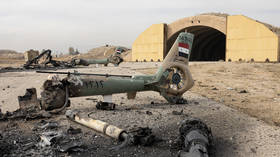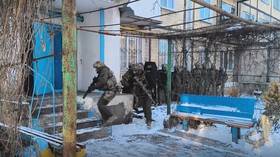RT’s Olympics blog: hello Beijing!
Well, after months of visa procedures and an 8-hour flight, we're finally in Beijing.
By Aleksey Yaroshevsky
One world, one dream was how the Chinese capital greeted us upon our exit from the plane. It seems that the world's biggest sporting event has captivated the hearts and minds of the world’s most populous nation.
Needless to say, the Olympics are something they've been anticipating ever since news of Beijing's right to host the games broke eight years ago. But after 24 hours spent in Beijing I got the feeling that the Chinese had been waiting for this chance long before that.
When I started learning Mandarin nearly a decade ago, I thought how hard it would be for a Chinese person to speak English. Their phonetic system is so very different from any European language, they literally have to twist their tongues to produce any sensible phrase in English. Of course, nothing – even the Olympics – can change that.
But their willingness to show their hospitality, to show that they have been preparing hard for this event, is heart-melting at times.
Last night we dined out at one of Beijing's most famous restaurants and when one of the waiters learnt that I spoke mandarin, he brought me a sheet of paper with several phrases like “What would you like to drink?” written in Chinese characters and asked me to translate and transcribe them.
They show politeness and courtesy in everything they do as if they're trying to show that they're not as mean as some are trying to portray them. During the day I received a call from the hotel reception: a lady told me that housekeeping noticed some cash on a table in my room (I left a few bucks worth of Russian roubles) and advised that I should keep them in a locker to be on the safe side. I laughed saying that now I didn’t believe it could be stolen.
The whole city is crammed with tourists and supporters from all across the world. Israel, Australia, New Zealand, Syria, Spain, Brazil – to name just a few of many different nationalities we have seen so far. And that's some three days before the games kick off.
I linked-up with several colleague-expats, who live and work in Beijing, and they told that many foreigners who work in the Chinese capital have gone on vacation and won’t return until after the Olympics finish. But from what I’ve seen so far, it seems that for every person who has left, another five have come to replace them.
The bar scene is as thriving as it usually is in Beijing. The city's main entertainment area near worker's stadium and the so-called Sanlitun area is crowded with different nations and races.
The only big disappointment for those who've been to Beijing in the past, is that probably the two best nightclubs in Beijing have closed down “for security reasons” – they're situated close to Olympic venues.
But even that didn’t seem to deter night clubbers. All the discos that are open are packed with people.
And even there that the Olympic spirit is felt. Some bars have invented cocktails with Olympic names like “Hurdling athlete” or “Somersault dive”.













